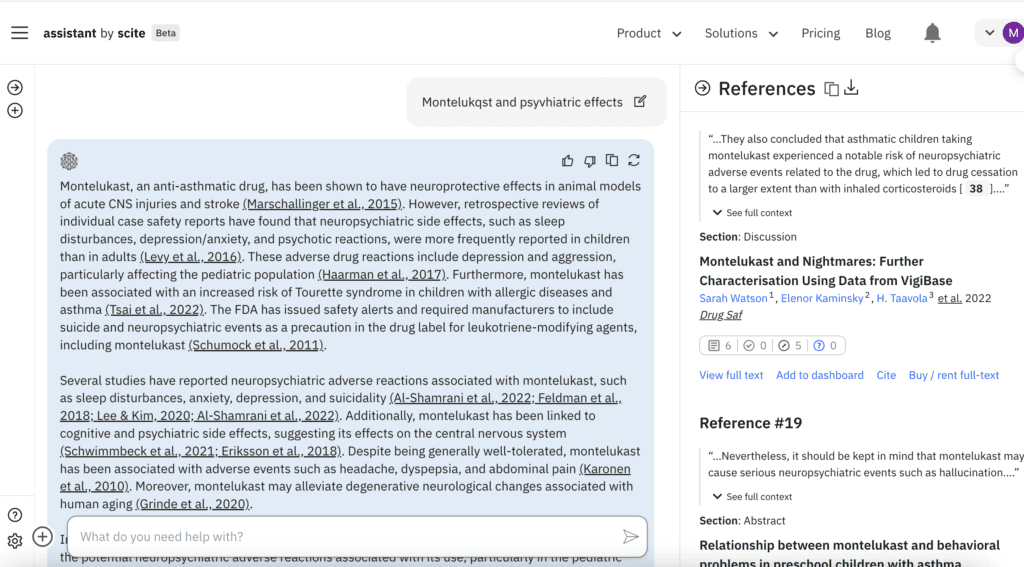According to a 2020 study, medical knowledge is estimated to double every 73 days or 0.2 years. This is a significant change from 1950, when the doubling time was 50 years, and 1980, when it was seven years. The rapid doubling of medical knowledge makes it more difficult for doctors to find new findings and guidelines for treating patients. The increase in patients with chronic diseases and multiple co-morbidities also puts a significant burden on doctors. That being said, while humans have a limited capacity for processing data, new AI models don’t have our constraints. My first month using Scite AI has been transformative. I see a light at the end of this data tunnel. Scite assistant has streamlined my research process and enhanced my clinical decision-making. Here’s a deep dive into my experience with this tool.
Harnessing the Power of AI for Clinical Excellence
In the fast-paced environment of the clinic, time is of the essence. Questions that require deeper, evidence-based answers often arise, pushing the boundaries of my existing knowledge. This is where Scite Assistant shines. It serves not just as a research tool but as a comprehensive assistant that aids in easily navigating the vast sea of medical literature. Whether it’s second or third-order questions about research or deciphering the guidelines from major societies on specific health issues, Scite AI has been my go-to resource.
Scite AI: Your Assistant to Exploring Medical Literature
One of the most striking features of Scite AI is its ability to delve into the literature surrounding the side effects of drugs or the mechanisms of various pathologies. This depth of insight is invaluable, especially when understanding the nuances of patient care and treatment options. The tool’s ability to sift through extensive databases with hundreds of millions of papers and present the most relevant, highly cited, recent studies has markedly improved my ability to explore rarer pathologies and interactions and be better prepared to read on my patients.
(example of one of my many quick sporadic misspelled query while in clinic)

Accelerating Research and Academic Productivity
Scite AI’s impact extends beyond the clinic into the realm of medical research. As someone engaged in continuous academic pursuits, the speed at which I can now access, review, and synthesize information is remarkable. The platform acts as a near-peer tutor, guiding me through the literature, helping refine my research questions, and significantly cutting down the time I spend on literature reviews. This efficiency boost is not just about saving time; it’s about enhancing the quality of my research output and allowing more room for critical analysis and creative thinking.
A Tool for Today with a Vision for Tomorrow
While Scite AI has proven to be a game-changer in many aspects, it’s important to acknowledge its current limitations. The platform’s focus is squarely on qualitative analysis, meaning it does not yet offer capabilities for mathematical calculations or direct analysis of data from studies. This specificity requires users to pose targeted questions to maximize the tool’s efficacy. Despite these limitations, the value Scite AI adds to both clinical practice and medical research is undeniable.
Final Thoughts: The Verdict on Scite AI
After a month of integrating Scite AI into my daily routine, I confidently say Scite AI is worth the cost. Its ability to provide quick, reliable, and in-depth insights into medical literature has enhanced my clinical practice and enriched my research endeavors. As I look forward to my career in healthcare, Scite AI and tools like it will remain a vital component of the learning and decision-making process. For fellow medical professionals seeking to elevate their practice and research, exploring Scite AI’s capabilities is a step toward future-proofing your expertise in the ever-evolving field of medicine.
Check Out Our other Articles!
5 AI Healthcare Researchers to Follow in 2024
10 Benefits of Artificial Intelligence in Healthcare
5 AI Tools to Supercharge Your Research Productivity and Insight
Can AI Save Science? Healing the Wounds of Academic Publishing
How Elicit Works in AI-driven Research
Elicit AI and Scite Assistant: How AI Research Assistants Work
10X Your Research With an AI Assistant: Guide to Using Scite










